This step by step woodworking project is about free elevated deer blind roof plans. This is PART 2 of the elevated hunting blind plans, where I show you how to build the roof and how to attach the exterior panels. My plans come with step by step instructions and you can easily adjust all the dimensions to suit your needs. See my other DIY projects HERE.
We recommend you to invest in the best materials you could afford. Therefore, you should buy weather-resistant lumber, such as pine or cedar. Always take accurate measurements before adjusting the size of the components at the proper size. Drill pilot holes trough the components before inserting the wood screws, to prevent the wood from splitting. See all my Premium Plans in the Shop.
Made from this plan
Elevated Deer Stand Roof Plans
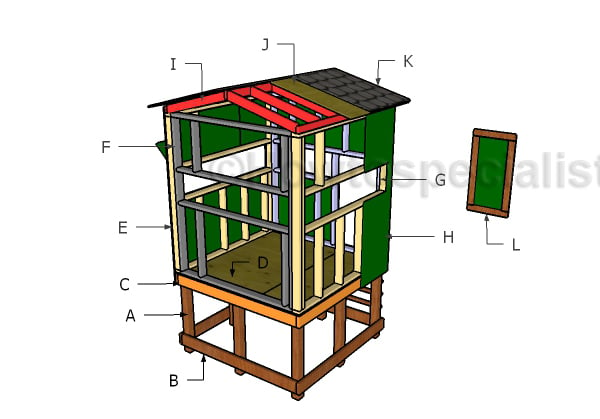
Building an elevated deer stand
Materials
- H – 12 pieces of 2×4 lumber – 35 3/4″ long, 1 piece – 72″ long, 2 pieces of 2×3 lumber – 72″ long RAFTERS
- I – 2 pieces of 3/4″ plywood – 24″x83 3/4″ long, 2 pieces – 48″x83 3/4″ long, 2 pieces – 24″x90 3/4″ long, 2 pieces – 48″x93 3/4″ lon
- J – 2 pieces of 3/4″ plywood – 42 1/4″x82″ long ROOF
- K – 60 sq ft of tar paper, 60 sq ft of asphalt shingles ROOFING
- L – 1 piece of 3/4″ plywood – 24″x34″ long, 2 pieces of 1×4 lumber – 25 1/2″ long, 2 pieces – 24″ long DOOR
- 2 pieces of 1×4 lumber – 8′
- 8 pieces of 3/4″ plywood – 4’x8′
- 2 pieces of 2×3 lumber – 6′
- 9 pieces of 2×4 lumber – 6′
- 2 pieces of 2×2 lumber – 6′
- 60 sq ft of tar paper
- 60 sq ft of asphalt shingles
- 10 small hinges, 1 latch
- 1 5/8″ screws, 2 1/2″ screws, 3 1/2″ screws
- stand brackets
Tools
- Safety gloves, glasses
- Miter saw, jigsaw
- Chalk line, tape measure, spirit level, carpentry pencil
- Drill machinery and drill bits
Time
- One Day
Building a gable roof for a deer stand
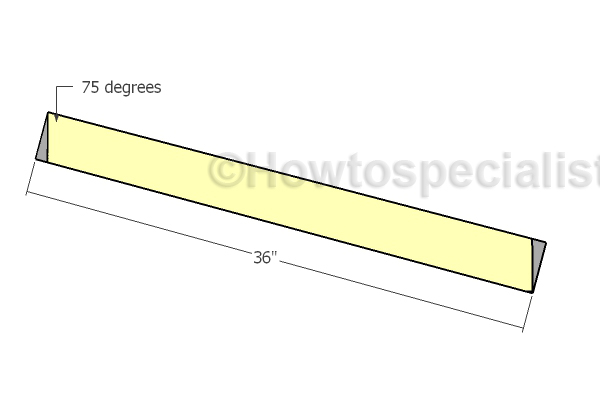
Building the rafters
The first step of the project is to build the rafters for the hunting house. As you can easily notice in the diagram, you need to make 15 degree cuts to both ends of the rafters.
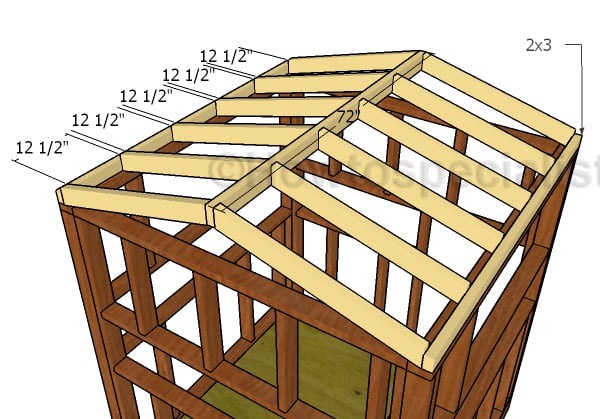
Building the roof
Fit the rafters to the top of the deer stand, as shown in the diagram. Drill pilot holes through the 2x3s and insert 2 1/2″ screws into the rafters. Place the rafters equally spaced and lock them to the ridge beam.
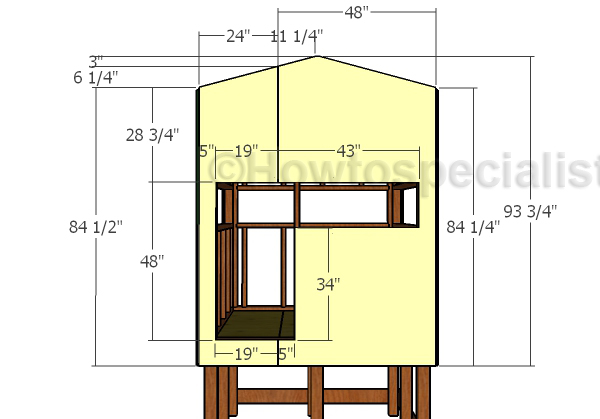
Front wall – siding
Use 3/4″ plywood for exterior wall siding. Use the information from the diagram to make the cuts around the door and window openings. Fit the panels to the framing and then secure them into place with 2″ brad nails.
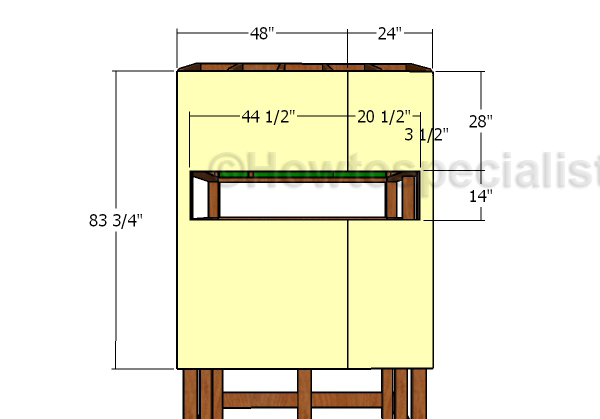
Side walls
Cut the 3/4 plywood panels and then secure them into place with 2″ brad nails.
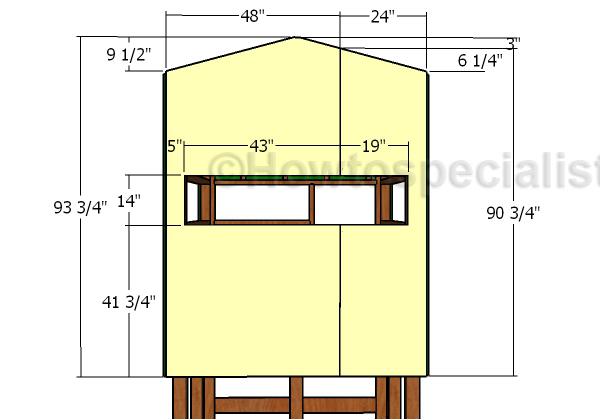
Back wall – Siding
Proceed to cutting the panels for the back wall, as well.
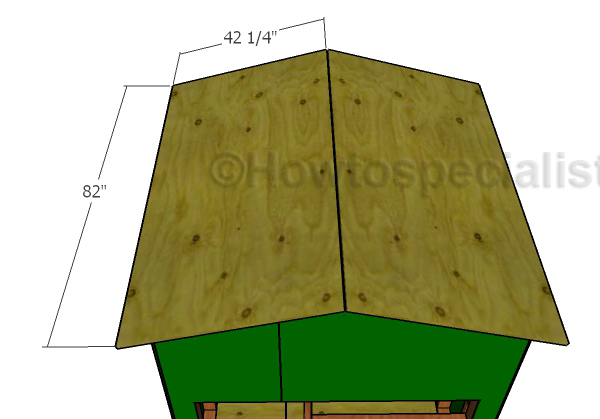
Fitting the roof
Use 3/4″ plywood for the roof of the deer blind. Cut the sheets at the right dimensions and then center them to the top of the structure. Drill pilot holes and insert 1 5/8″ screws into the rafters.
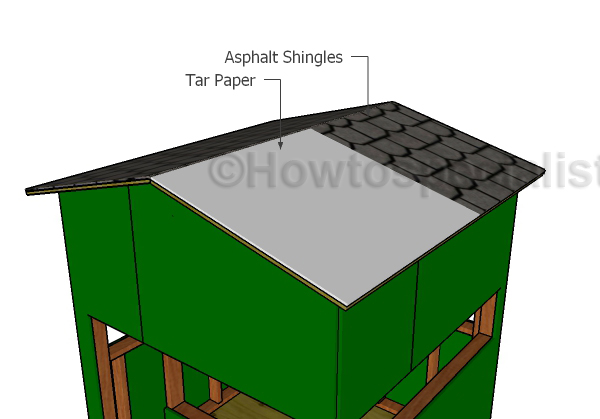
Fitting the roofing
You could fit asphalt shingles to protect the deer blind, as it is a straight forward solution. Therefore, install roofing felt over the roofing sheets, making sure the strips overlap at least 2″. Secure the tar paper to the plywood sheets with roofing staples. Fit the side drip edges over the roofing felt, while the bottom drip edges should be fit under. Place a starting course at the bottom of the roof, before installing the asphalt shingles. Always read the manufacturing instructions before starting the installation, as there are several aspects that differ.
Smart Tip: The first course should star with a 3 tab shingle, the second course with a 2 1/2 tab , the third course with a 2 tab, the forth course with a 1 1/2 tab, the fifth course with a 1 tab, the sixth course with a 1/2 tab. Repeat the process from the beginning, starting with the seventh course. Don’t forget that the shingles should overhang from the drip edge about a 1/4″. In addition, secure the asphalt shingles to the roof decking with tacks.
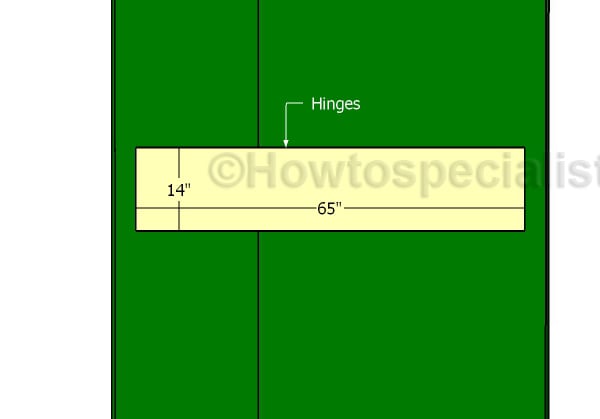
Blinds – Side
Fit 3/4′ plywood panels to the window openings, so you can seal the deer stand when not using it. Use hinges to secure the blinds to the wall of the structure.
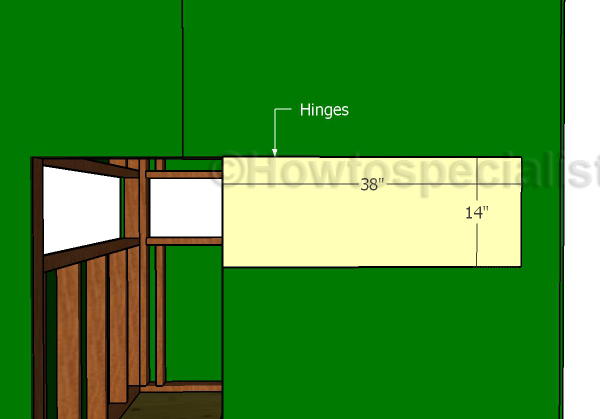
Blinds – Front
Fit the blinds to the front wall, in the same manner described above.
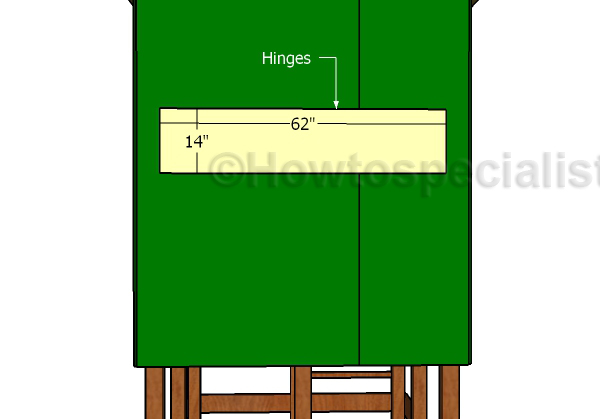
Blinds – Back wall
Last but not least, fit the blinds to the back wall.

Building the door
Use 2×4 lumber for the door frame. Drill pilot holes and insert 1 5/8″ screws to lock the panel to the door frame.
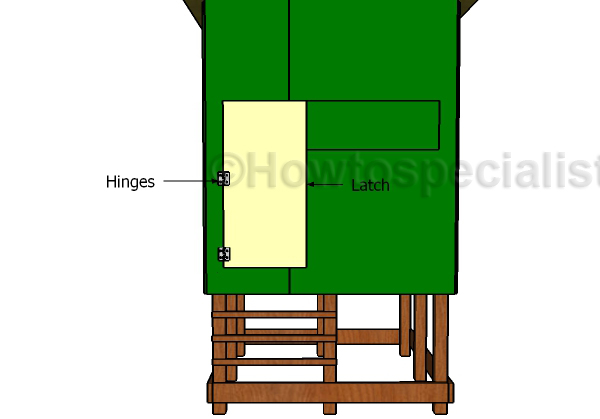
Fitting the door
Fit the door into place and secure it to the walls with hinges and with a latch.
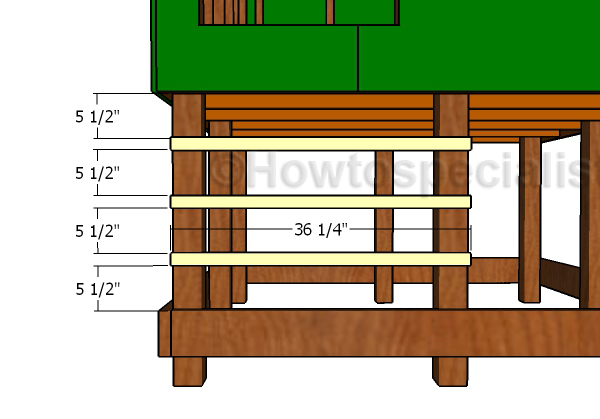
Fitting the steps
Fit 2×2 steps to the front of the blind, so you can have an easy access to the interior.
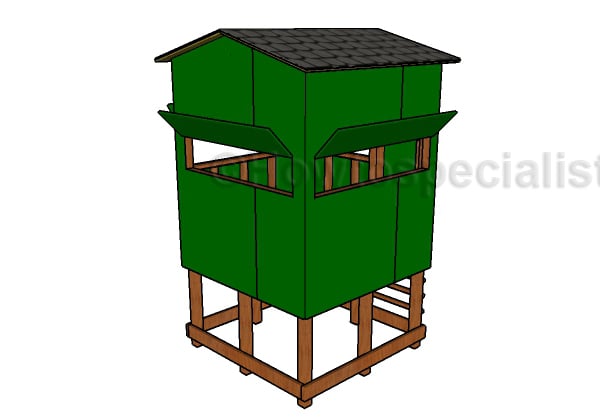
Elevated Deer Blind Plans – Back view
As you can see in the plans, this elevated deer blind has a nice appearance and it will blend in with the landscaping. Apply a few coats of paint to ease the job.
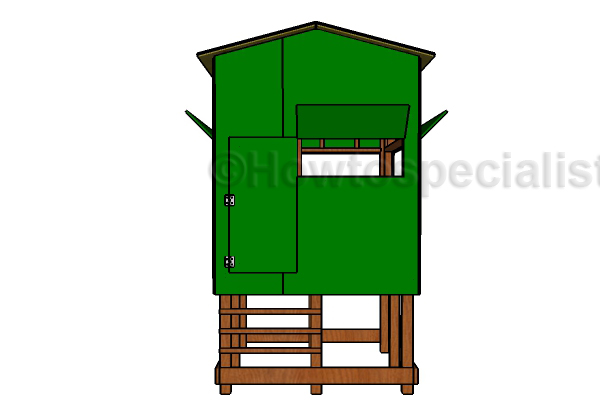
Elevated Deer Stand Plans
If you want build this deer blind you should check out PART 1 of the project, where I show you how to frame the deer stand. If you like my project, don’t forget to SHARE it on Facebook and Pinterest.
Thank you for reading our project about free elevated deer blind roof plans and I recommend you to check out the rest of the projects. Don’t forget to LIKE and SHARE our projects with your friends, by using the social media widgets. SUBSCRIBE to be the first that gets our latest projects.
<< Previous | Next >>

2 comments
Can I ask how you get the roof on in a safe way? I was thinking about going with a metal roof, not sure how to get on the top to screw the metal to the rafters without possibly getting hurt.
I’d also like to know, my base will be at 8 ft. That’s a long fall for an old man